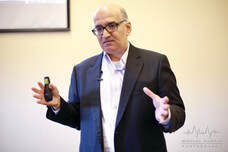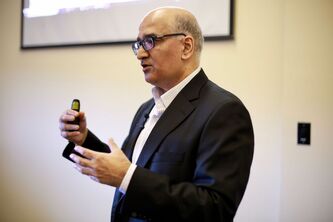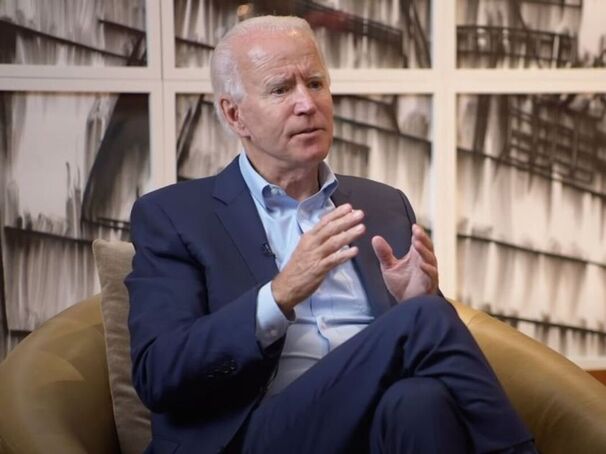|
The purpose of any interview is to show up, stand out, and secure an offer. If you are meeting Joe Biden, then you are on a shortlist of potential candidates. You will prepare to show up. But you still don't have an offer, So what do you do to stand out? You must seize control during the interview. Seizing Control This is the most important part of any job interview. The reason for this is that the interviewer will take a very short time to make a go/no-go decision; hence, you must seize control very early. The best way to do this is to have a three-minute pitch ready to be delivered on why you should be hired. The purpose of the pitch is to steer the conversation toward a direction where you can score points and win. To pull this off, you need to script the pitch first, practice hard and perform at the interview. In this post, I have shown the script of a pitch I would use to seize control. Look, you don't have to like Joe Biden to do this exercise. This exercise is all about how you would show up, stand out, and secure an offer if you were under consideration for the VP job. This what we all have to do when we are on a shortlist for a job. I coach people on job interviewing, and getting my clients to do a three-minute pitch is very hard, including those pursuing executive-level jobs. Most never do it no matter how much I encourage them. The only conclusion I can draw from this is that getting rejected is a lot easier than making a three-minute video that could help them get the job they want. People don't like to put in the work that is necessary. Interviewing is the most important skills for success. If you would like to learn more, you can watch the talk I gave on this topic: Interviewing is the Most Important Skill for Success... Today. Why three-minute speech is important to getting a job? A three-minute pitch is important because it allows you to focus, based on your research, on what will resonate with the interviewer. You don't want to think during the interview. You want to do most of your thinking before the interview during your preparation. Preparing for a job interview is no different than how PGA professional golfers prepare for major golf tournaments, if not all tournaments. I was watching the PGA Championship, and when golfers were interviewed after their round of play, they all tend to say they tried to stick to their process and not think on the course. The winner of the tournament will be the player who has a good game plan and can execute well will walk away with the Wanamaker trophy. The three-minute speech will allow you to stand out in any interviews, including interviewing for the VP job in any field and likely securing a job offer. Does this mean you will always walk away with a job offer? No. It just means that you will have done everything in your power to stand out. The decision to hire you is outside your control. Similarly, a golfer can only control the ball he or she is hitting. A golfer can't control how others play the game. Rough Script of the Three-Minute Pitch for the VP Job ( Indented ) I wholeheartedly agree with you when you say that the soul of our country is at stake in this election. I believe as you do that the experiment to make this a perfect union will end if we don't win in November. That's why it's critical that you pick the VP that will give you the best chance to win in November, and help you move this country toward the vision of our modern founding fathers like John Lewis. So what does restoring the soul of our country mean to me? It has two parts. One is believing in fundamental American beliefs; second, governing and prioritizing based on those beliefs. Fundamental American Beliefs The traditional American beliefs have been life, liberty, and pursuit of happiness. But we need to revise that since we have lost our ways since Donald Trump became president. We need to restore beliefs in the following: Constitution Democracy Justice Decency Facts Science Compassion Equality When we start becoming more like autocratic countries, we start losing the soul of our country. Time has come to revise the Declaration of Independence and come up with a Declaration of Revival. Governing Beliefs The second part is to govern based on those fundamental beliefs. We have to strengthen our national security, economic security, and future security. National Security
America is first when it leads, not when it follows or hides. With your leadership and the outstanding team you will put together, I know America will again be the leader of the free world. And when that happens, the world will be a better, safer, and prosperous place. And I will contribute in any way I can to make that happen. Now it's your turn to come up with a script of a three-minute pitch you would use if you were under consideration for the VP job. If you don't do it for this exercise, you will need one when you are interviewing for a job. It will increase your chances of securing an offer. #####  Jay Oza is an author, speaker, executive coach. He makes people thrive on high stakes stage whether it's for a job interview, a sales presentation or a high-stakes speech. He is the author of a practical book Winning Speech Moments: How to Achieve Your Objective with Anyone, Anytime, Anywhere. You can get this book on Amazon for 99 cents for limited time. Please download the free speech checklist that you can use to help you create a winning speech for any situation. Please contact him if you would like to have a two 75 minute coaching session on job interviewing or high-stakes speaking. If you are interested in inviting him to give a talk on job Interviewing or high-stakes speaking. You can reach him at [email protected].
0 Comments
Tasha Eurich, the author of Insight, writes in her book that self-awareness is a meta-skill for success. Self-awareness, according to Eurich's research, has many beneficial effects:
As you can see, self-awareness is a critical skill for success in just about everything. However, most people don't put a lot of importance to this skill especially when they are developing relationships or looking for a job. I think it would save them a lot of grief later if they focused on self-awareness, so they don't end up wasting a lot of time, energy, and money. The reason to be attuned to this skill is simple. It is hard to become self-aware if you aren't. Soft skills like self-awareness are not "soft," they are very hard. It is also very hard to detect someone's soft skills if you are not good at identifying what that even looks like. For example, have you ever seen a person who is not self-aware able to make a change? It is rare and has taken that person who was able to change a very long time. In this post, I focus on looking at self-awareness when you are interviewing for a job. We spend so much time in this endeavor, so it is important to know how self-aware people are whom you may end up working with. And also determine whether the organization overall is self-aware. The only way to find out is to ask three simple questions during the interview. I have modified three questions that Eurich uses when she is conducting a Team Candor Challenge at workshops with corporate clients. You can ask these three questions to get a good idea of the self-awareness quotient of an individual and the organization. 1) What does each of your team members do that contribute to the team's success? 2) What behavior could each person change that would make the team more successful? 3) What do I need to do to make the team successful? Assuming that you determine that people and the organization are self-aware, you still have to keep working on it from the day you start work. If you do, you will not only enjoy your work but enjoy being around your team. You will find that a cohesive team is usually highly self-aware. It is a lot of work, but without developing and mastering this skill, you will find life hard and work even harder. #####  Jay Oza is an author, speaker, executive coach. He makes people thrive on high stakes stage whether it's for a job interview, a sales presentation or a high-stakes speech. He is the author of a practical book Winning Speech Moments: How to Achieve Your Objective with Anyone, Anytime, Anywhere. Please download the speech checklist that you can use to help you with your next high stakes speech. Please contact him if you would like to have a two 75 minute coaching session on job interviewing or high-stakes speaking or interested in inviting him to give a talk on job Interviewing or high-stakes speaking. You can reach him at [email protected]. If you are currently out of a job or looking for a better job, then it’s no secret that you’re frustrated with the interview process. You are not alone. In this blog, I will give you some ideas on how to navigate the interview process by breaking it down into five steps. Getting a good high-paying job comes down to five key questions:
If you don’t have marketable skills, then you must address this quickly since companies want certainty; thus, they are very risk-averse. If you find yourself in this situation, my suggestion is to take a temporary job, consult or do some volunteer work while taking courses to build your marketable skills. Today, you have to be a lifelong learner and keep stacking skills that will make and keep you highly marketable. And the only way to know that you are marketable is by constantly testing the job market. So you have to develop and master your interviewing skill. Briefly, here are the five Interview steps that you typically go through: First Step -- This could occur through social media like LinkedIn, YouTube, blog, resume with a cover letter or some networking contacts. In this step, you are going to be interviewed indirectly. Second Step -- This occurs via phone with an internal recruiter, employee and/or hiring manager. This is a discovery call, so you want to keep this call short between twenty to thirty minutes. It is better to have multiple calls than one long one. Third Step -- This occurs face to face onsite or offsite, and it is going to be detailed since you are going to have to make a go/no-go decision. Fourth Step -- This will be a reference check. You are going to be interviewed indirectly. Fifth Step -- This is Go/No-Go decision step by the company. You are going to be interviewed indirectly. Breaking the interview process into five steps will help you navigate through the process with focus, strategy, and confidence. It will increase your chances of getting a job offer. To interview effectively, you must have consistency during the entire five steps of the interview. And that means that you have to focus on these five key questions:
You will not need to answer all four questions for all the steps, but you do need all of them if you want to land a job offer. All questions that you are asked will fall into these five buckets, so it is important you prepare well by focusing on these five questions, so you have a solid game plan to execute and win. If you don’t, you are likely to lack focus and could potentially confuse interviewers and end up wasting time. Remember, the interviewers are not going to remember much, so the burden is on you to make them remember you. And the reason you have to make the interviewers remember you is that when they are discussing you or making a decision, you are not going to be in the room. You have to make sure that they can answer those five questions for you. You have to keep feeding the answers until they can do a got job representing you in absentia. First Step This could happen one of three ways: social media, resume with cover letter or networking. If your resume is submitted through your networking contact, it is important you provide your networking contact the talking points, so he or she does a good job selling you. Hence, it is your job to empower your contact with the answers that you understand the job, you can do the job, and you want the job. Similarly, you have to craft your social media profile on LinkedIn and resume that answers the five key questions since that is what an employer is really asking when you are not there. You have to be direct and specific, so you don’t waste your time. Clarity acts as a qualification, so you only receive calls from companies that want what you have. The one thing that many job candidates complain about is how hard it is to get one’s resume selected by the Application Tracking system (ATS) that companies widely use to filter resumes. We don’t know what kind of parameters the companies are using for ATS, so I recommend you create two resumes. One resume for the ATS that is heavy on the skills based on the job description and light on the five key questions I cover here. The second resume is for interviewers that is heavy on the five key questions and light on the skills mentioned in the job description. After you receive a call from a company, you probably want to send the recruiter a resume you have created for interviewers. The two main questions you want to focus on are the following:
The outcome you want to achieve in this step is for someone from the company to contact you, and most likely it will be an internal recruiter. Second Step Before you talk to the recruiter, you want to find out three areas the recruiter wants to talk to you about. At a high level, you must know what to expect when you have the call. The one thing many candidates do that is amateurish is they have no idea what the conversation will consist of. You do not want to get on a call blindly. You want to be prepared, so you don’t get ambushed. Your objective is to have a good conversation that makes you sound like a professional. Again, your focus on the phone should be on just questions:
The other two questions are appropriate to bring up during a face to face interview where you are interviewing with people who will make the hiring decision. Your objective on this call is to qualify the opportunity well so you can determine if the job is a good fit for you. If the recruiter feels the same, then ask the recruiter to schedule a 30-minute call with the hiring manager. Note, you don’t want to take on an onsite interview until you have qualified the opportunity well and both you and the hiring manager agree that there is a good mutual fit to necessitate a face to face interview. I will leave it up to you to decide if you want to take an offsite meeting to get to know some of the team members and the hiring manager a little better. The desired outcome in this step is to move to a face to face meeting. Third Step If you and the company don’t have urgency or you are interviewing for a position that is not advertised, then it makes sense to have an unofficial interview off-site. This will allow you to qualify the opportunity further, develop your network, gauge the company’s interest and stay in the game. You don’t want to look like you are desperate. The informal interview will allow you to find out more about the company that is not easily accessible on the Internet, its culture, its people and the job that they need to get done. You will get more information to determine whether you want to go for a formal interview where everyone is guarded, so it is hard to tell what it is going to be like after you join if you get the offer and accept. For formal face to face interview, you have to open it up to all five questions since it’s performance time and you are there to win the job offer. Again, before you meet with the interviewers, you should get each interviewer to send you three areas he or she wants to cover with you. This way you can be better prepared to have good conversations to make a go/no-go decision. Also, you have to continue to qualify the opportunity to make sure this is more than a place you want to work, but a place that will enhance your career. Before you leave, you want to validate that interviewers think you understand the job, can do the job and ready to start. If you don’t do this, you are committing interview malpractice. Note, companies make quick decisions so do not give them more than 24 hours to get back to you with a verbal commitment. If there is a mutual interest, you are not done until you get the written job offer. You will still have to go through reference checks which, unfortunately, many candidates do not devote much time with. And it is possible, you may still have a final face to face interview with a senior executive or the CEO who will be involved if you are deemed a strategic hire before a final decision is made. Until you are extended a job offer, you have to keep qualifying the opportunity and look for any inconsistencies during the interview process. You do not fall in love with the company, people or a job. If you do, then you will miss potential signals of potential problems. Companies want a perfect candidate. Similarly, you want a perfect company. If there is a fit and you like everything, then you should try to close it out with a go/no-go decision. You can’t move to the next step until you get an email from the hiring manager or human resources manager indicating that the company would like to make an offer after the reference checks or any other checks. Note, until the offer is formally made, you don’t have an offer. If there is a delay, then you should ask what could cause the offer to be withdrawn. This is the step where you want to open up to focus on all five questions, since you may not get another chance to meet face to face. You are in it, so go win it. That should be your attitude in this step of the interview. The five questions include the following:
The desired outcome in this step is to get a verbal job offer. Fourth Step This is another important step in the interview process that many ignore. When someone calls your reference, you are being interviewed indirectly. The same five questions are going to be asked of your references. You have to make sure whom you select as your reference is articulate, motivated and coachable to help you get the job. That means that a person better spend some time with you so he or she can perform on your behalf. If they are not willing to help you, then don’t use them as your references. If you are not careful, you could lose the job offer if your references don’t make you look good. If they are not articulate, at the least, they should do no harm to your getting a job offer. If your reference creates any doubt, then the company may delay or rescind the job offer. You have to coach your references that you understand the job, you can do the job, and want the job. Keep it very simple for them. You should keep your references in the loop, so they are already thinking of how to help you when it’s their turn at bat. Make sure your references ask the person who will be calling them to send them by email three areas they want to cover about you. Again, you want your references to realize that this is a high-stakes call. It is your job to let your references know that if they don’t perform, they could hurt your chances. For this step, you want to focus on just two questions to keep it simple for your references:
The desired outcome in this step is that the company feels further assured that they made the right decision in hiring you and will pull all the stops to get you to join, even a higher salary. Fifth Step This is when the decision is going to be made. You may have to meet with the final decision maker that could be the CEO or a senior executive. You don’t want to assume this is a formality since the company may be down to two final candidates and only one person can get the job. You must take this last interview very seriously and must perform to close the deal. If there is a final interview, you can’t go in cold. You want to ask the hiring manager to have the senior executive send you three areas he would like to cover with you. You can’t be scared to ask at this point. Remember, you are not interviewing; you are doing a job so act like a professional. Whether you have a final interview, it is important that your thank you note after the face to face interview is more than thanking them for meeting with you. It is your final closing argument as if you are an attorney. You have to focus on the five questions so if there is a meeting to decide who should get the offer, you want to make it easier for them to champion you. You don’t want them to think about the value you bring. Just give it to them on a silver platter. The questions you want to focus on three questions to keep it simple:
One More Thing It is possible that you may not accept the job or the company may not extend a job offer to you. No matter what, you should always negotiate before taking a face to face interview to have a 15-minute post-decision call to see if there was anything that could have been done by either side to close the deal. You also want to add the hiring manager to your network since you both can help each other out. Just because it did not work out this time does not mean it can’t work out in the future. A lot of people don’t do this and miss a big opportunity to grow their network that can help them get an excellent job or expand their business network. Final Step As I mentioned earlier that it is important to determine how marketable you are so you know what skills you need to add. You have to test the market so you will have to go through these five steps of interview frequently even if you have no intention of leaving your current job. You are the CEO and salesperson of the most important product: You. You have to take charge of your career. You can’t outsource or neglect this important function. I want to remind you of my experience that you do not want to get lulled into thinking that you can’t lose your current job. You could be doing a great job, but that won’t save your job, There are so many things that can happen that are outside your control such as an acquisition or merger, change in company’s direction, change in management, loss of funding, etc. Your antidote to job security is to possess both marketable and interviewing skills. I think now you know that to get a good high paying job, you not only have to have excellent marketable skills but you also need an outstanding strategy to interview well across all five steps, so you have an excellent chance to walk away with a job offer. The interview is the most important skill for anything, especially getting a good high paying job. But to do this well, you have to make this skill a competency since you will be using it over and over again to get ahead and stay ahead. #####  Jay Oza is a writer, speaker, executive coach. He makes people thrive on high stakes stage whether it is for job interviews, sales presentation or an important speech. He is the author of the book Winning Speech Moments: How to Achieve Your Objective with Anyone, Anytime, Anywhere. In addition he was recently recognized by Hire Heroes USA for his outstanding volunteer work with military veterans and their spouses for coaching them get good high-paying jobs when transitioning from military to civilian life. Please download the speech checklist and the speech workbook to help you with your next high stakes speech. You can get more information at www.winningspeechmoments.com. You can contact him at [email protected] or 732-847-9877. If you have a high stakes event (job interview, sales meeting or a big speech) coming up soon, please contact him right away that is if you want to win. |
AuthorJay Oza Archives
July 2024
Categories
All
|
© 2017 Winning Speech Moments




 RSS Feed
RSS Feed